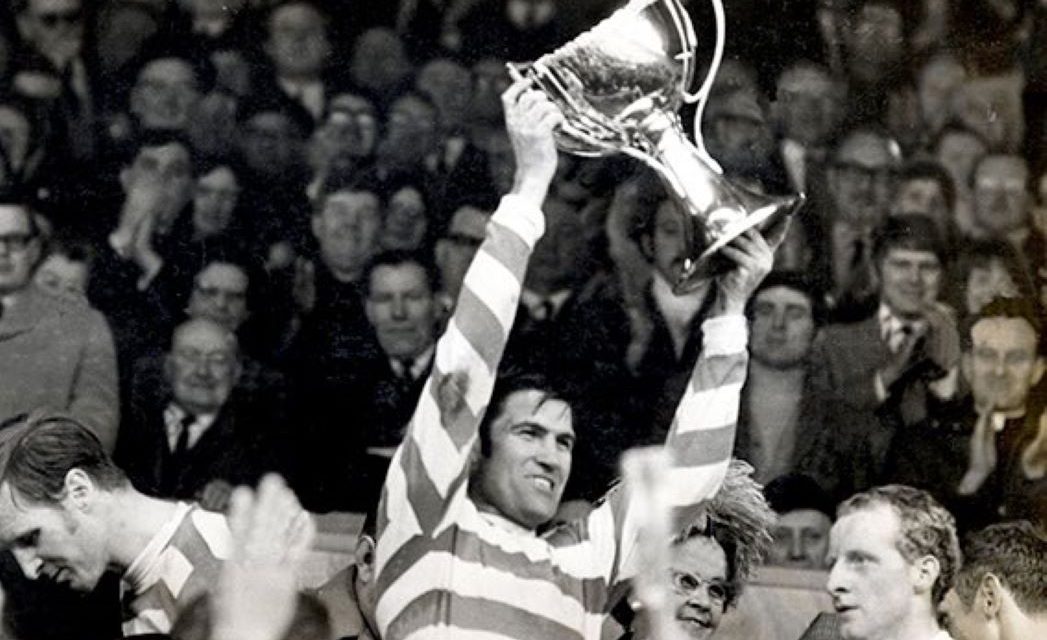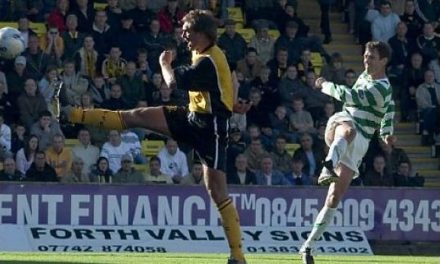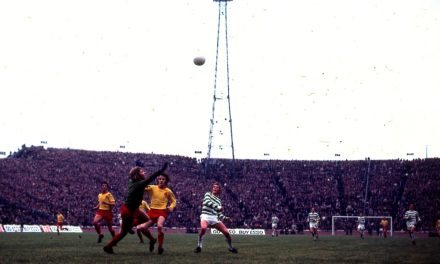It was Bertie Auld’s proud boast that he was perhaps the only player who signed for Celtic three times, having signed initially in 1955, then going on loan to Dumbarton in 1956, and re-joining Celtic after a spell down south with Birmingham City in 1965. But then again, Bertie Auld was remarkable in almost everything that he did.
Originally a fine left winger, Bertie had a temper on him and this led to disciplinary issues and run-ins with Celtic’s autocratic chairman, Bob Kelly. As many found to their cost, you did not cross the powerful Kelly or get on his wrong side. After being sent off for retaliation, playing for Scotland against Holland it was only a matter of time before Bertie was moved on and he was sold to Birmingham City where he made a fine impression. Birmingham reached the Fairs Cup final where they lost to AS Roma but Bertie’s time with ‘Brum’ was also littered with disciplinary problems. Rodney Marsh confirmed on Twitter just the other day of the time he once witnessed Bertie play against Fulham where he head butted the legendary English international, Johnny Haynes, then proceeded to knock out Fulham’s Maurice Cook with a punch, before proceeding to simply walk off the pitch.
Celtic were in dire straits in early 1965 with no major trophies won since 1957. Drastic action was needed and a deal was done to take Jock Stein from Easter Road to Parkhead in March 1965. Stein knew Auld was pining for home so Celtic moved quickly to bring Bertie back to Celtic Park before Jock himself had even arrived. The effect was instantaneous. Bertie scored 5 goals on his debut against Airdrie and proceeded to help Celtic to the final of the Scottish Cup. The club had not won a trophy for 8 long years and the Scottish Cup final replay defeats of 1961 and 1963, to Dunfermline and Rangers respectively, had left terrible mental scars with both the supporters and the players. This Celtic side were viewed as failures and something had to change.
The 1965 Scottish Cup final is arguably Celtic’s most important game in their history. Twice Dunfermline took the lead before Bertie twice pulled Celtic back level. His first goal was a remarkable effort when the outjumped the Pars’ keeper after Charlie Gallagher’s shot had flew high on the air off the crossbar. Billy McNeill’s late winning goal is the stuff of legend but it should be noted that Bertie carried a nervous young Celtic team on that day. From that day forward, Celtic’s fortunes were changed utterly.
Stein now took full control at Celtic and his master stroke was to convert Bertie from his left wing beat to being a midfield playmaker. Now wiser, and far more disciplined, Bertie and Bobby Murdoch became the engine room of Stein’s great Celtic side. Bertie gave Celtic an essential blend of both guile and steel. In 1966-67 Celtic won every competition they entered. The first trophy won was the League Cup against Rangers and Bertie created the winning goal, with a glorious long ball to the back post for Joe McBride to head down for the inrushing Bobby Lennox to score. A goal which was stunning in its creation and execution.
The final trophy won that season was against Inter Milan in the European Cup final in Lisbon. That game was arguably won in the tunnel. As the tanned Inter players lined up looking like Adonises, Bertie quickly clicked that the Celtic players may have picked up an inferiority complex so he began singing the Celtic song with all the players joining in, chests out and heads high, marching on to the pitch. Psychologically it was a master stroke and Celtic went on to destroy Inter in the most one sided of finals even although the score was only 2-1.
Between Bertie arriving in 1965 and departing in 1971, Celtic won an astonishing 15 out of a possible 19 domestic trophies. During this spell, Bertie became one of Celtic’s all-time greats, the epitome of the Glaswegian term, ‘Gallus’. He also had that very distinctive look, with the five o’clock shadow, the diamond white smile and that mop of thick black hair. Bertie cut a unique figure on the field of play.
It was perhaps in the European arena that he was at his most effective. The European Cup ties in 1970 against Fiorentina and Leeds gave him the great stage which he needed to display his creative play and guile which guided Celtic to another European Cup final. In his last season with Celtic in 1970-71, the Celts were pushed all the way by Aberdeen and Bertie enjoyed an Indian summer with many Celtic supporters recalling the 8-1 win at Dens Park in January 1971 when he was at his amazing best. His last game was against Clyde in May 1971, with the league won, when a large crowd turned out to pay tribute to the Lisbon Lions, who collectively played their last game as a team minus injured goalkeeper, Ronnie Simpson. It was only fitting that the Celtic players carried Bertie off the pitch shoulder high at the end, much to the delight of the Parkhead crowd. This was the stuff of legend.
Although Celtic would continue to be successful, something was missing when Bertie departed for Hibernian. In the 1972 and 1974 European Cup semi-finals, against Inter Milan and Atletico Madrid respectively, Celtic failed to score in 390 minutes of football over four games. The feeling remains that a Bertie Auld would have added the craft and cunning that Celtic missed on those occasions and thus two more European Cup finals were narrowly missed. Gerry McNee once stated that the Lisbon Lions had four players who were undoubtedly world class. Bertie was one of them (the others were Gemmell, Murdoch and Johnstone) and Stein never managed to replace the guile Auld brought to the team.
Bertie had a fine managerial career with Partick Thistle and Hibs later on in his football career. In 1978 he was said to be on a 3 man short-leet for the Celtic manager’s job to replace the great Stein, a post which Billy McNeill was always going to get. However, it would have been interesting to see what Bertie could have achieved as a Celtic manager as he had a very astute football brain.
In later years Bertie was regarded as being a legend in his own lifetime. Stories about him are legendary and everyone will have their own selection of favourites. In the mid 1980’s Jim Baxter claimed in the media that Rangers fine early 1960’s side was better than the Lisbon Lions. Ever the defender of the Celtic faith, Bertie’s response was swift and to the point –‘Tell Jim he’s welcome up to my house and I’ll show him medals that he’s never seen!’
In 1987, there were many 20th anniversary celebrations for the Lisbon Lions to mark their 1967 European Cup success. Celtic had experienced a poor season with Mo Johnston, Brian McClair, and Alan McInally all skulking away from the club at the season’s end. An emotional Bertie told a huge crowd of his pride of signing for Celtic three times and ‘would sign for a fourth time if his legs could carry him.’ He was a reminder at an important time in the club’s history of what a real Celtic player should be.
On a personal level I took my son to Parkhead in 2013 to purchase Willie Wallace’s new autobiography for his Granda’s birthday. As we walked towards the superstore I was aware of Bertie coming towards me from the side. To my delight he stopped to talk and made a fuss of junior, then aged 9. I told the boy that this was the great Bertie Auld, who was his Granda’s favourite player. Afterwards my son asked me how I knew Bertie Auld and I said that was the first time I’d ever met him. That was the effect Bertie had on people. He had time for everyone.
The Good Lord has now come calling. Come in number 10 your time is up.
Rest in peace Bertie. You’ll never realise how much we are in your debt.





